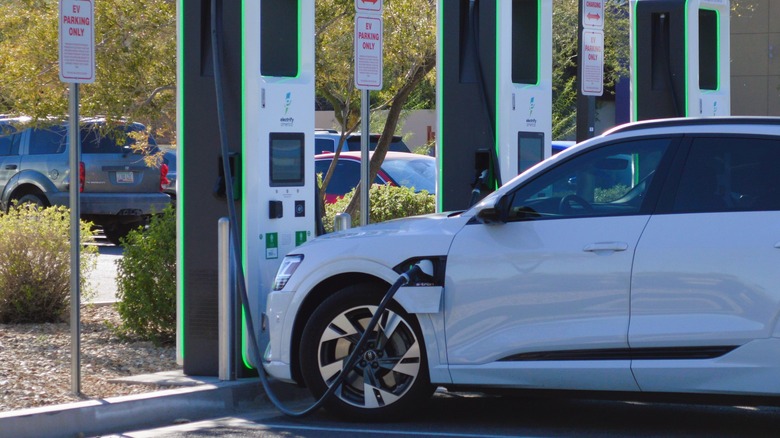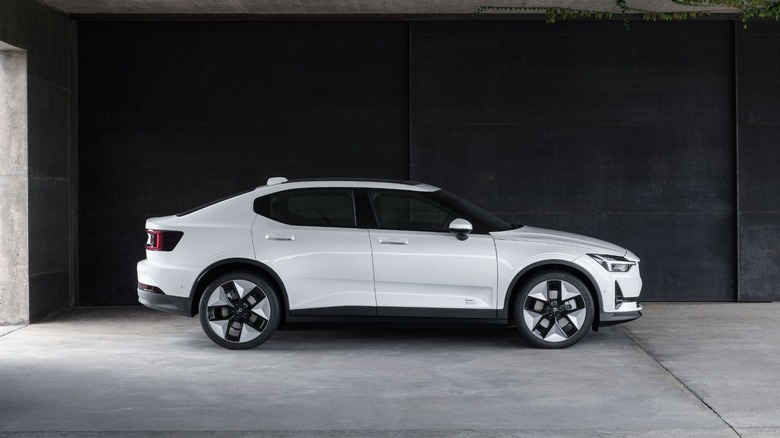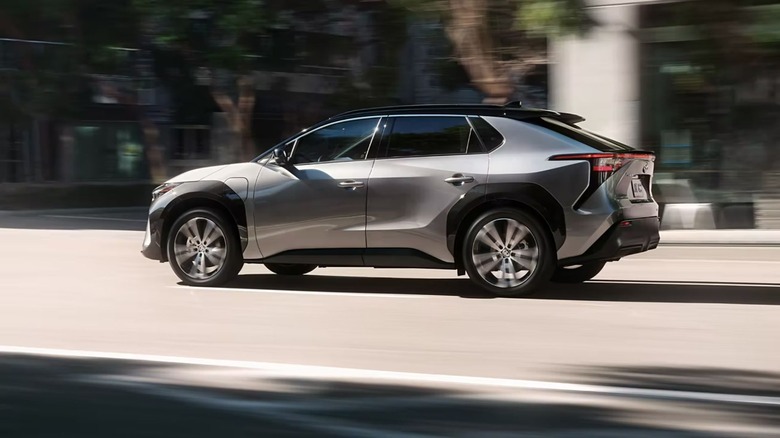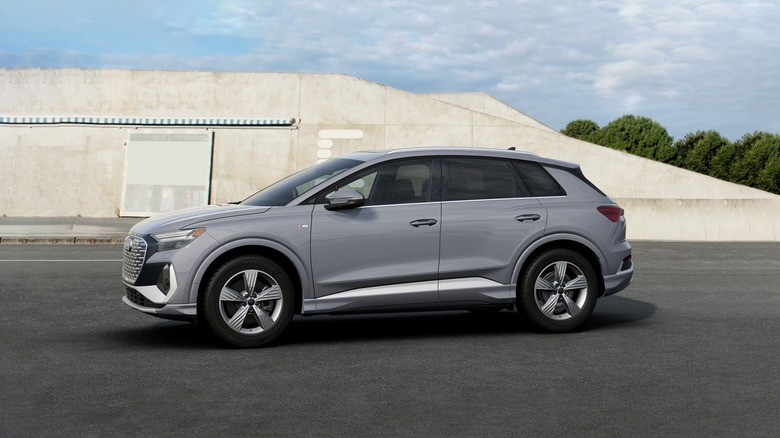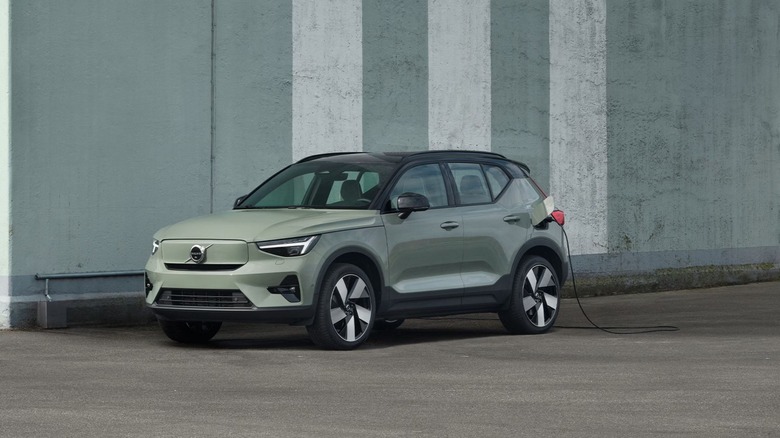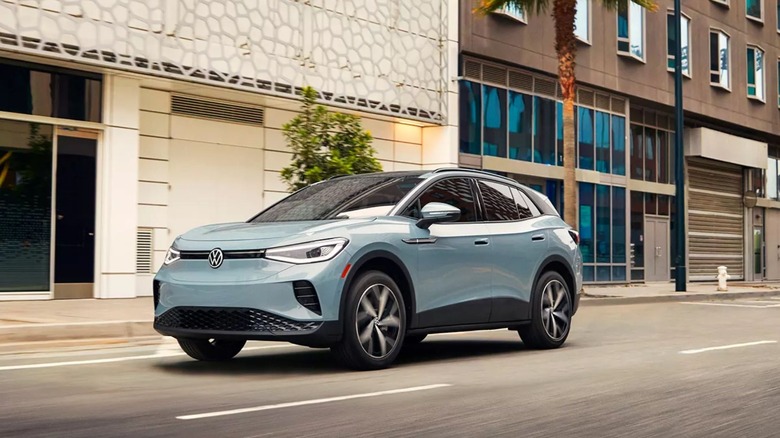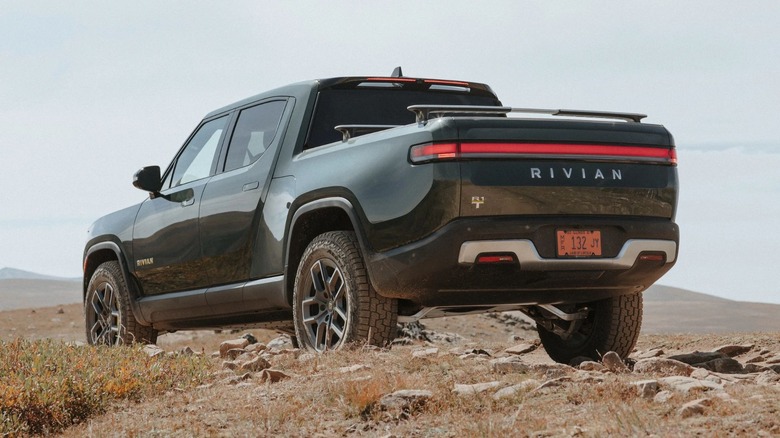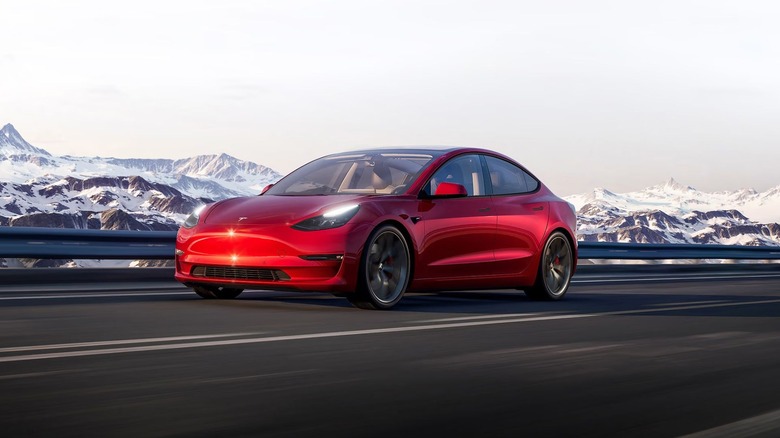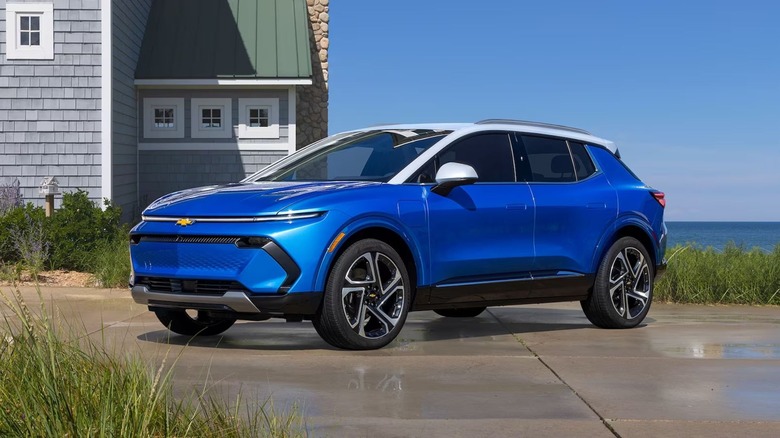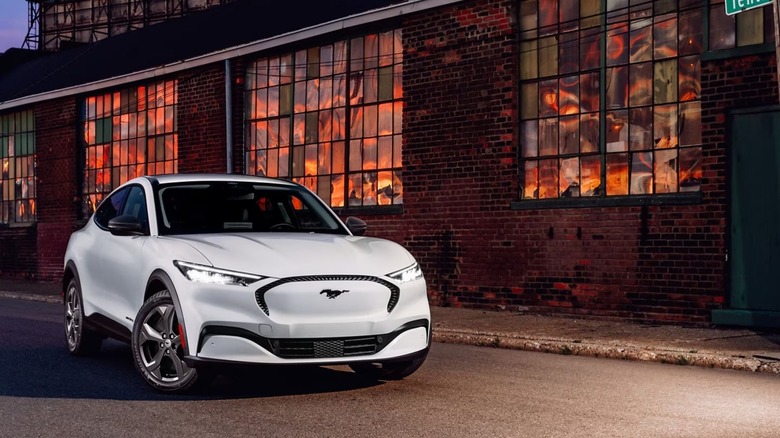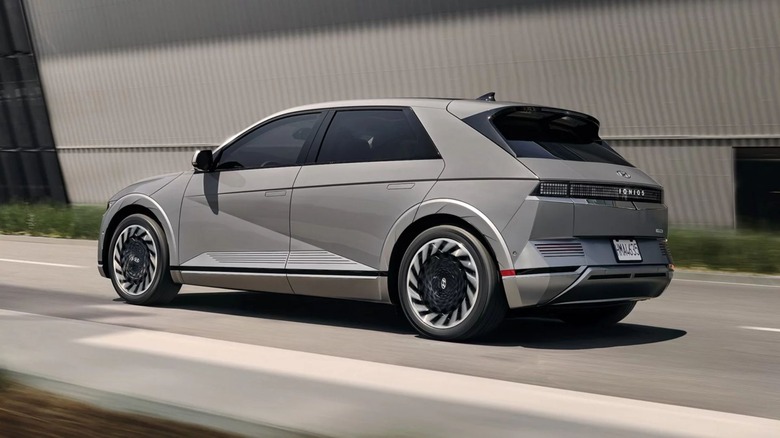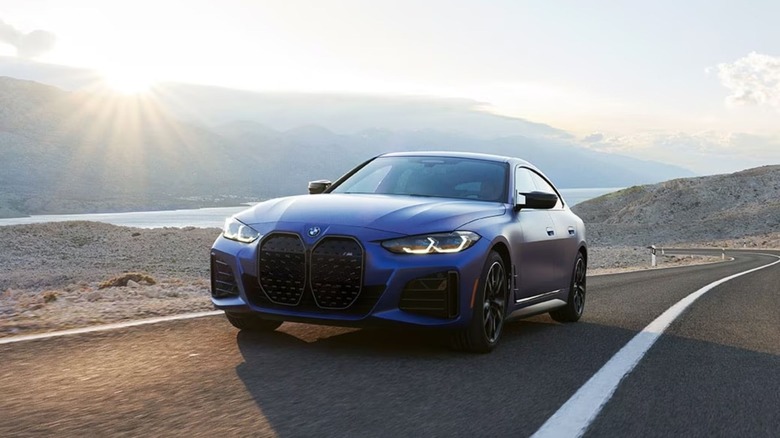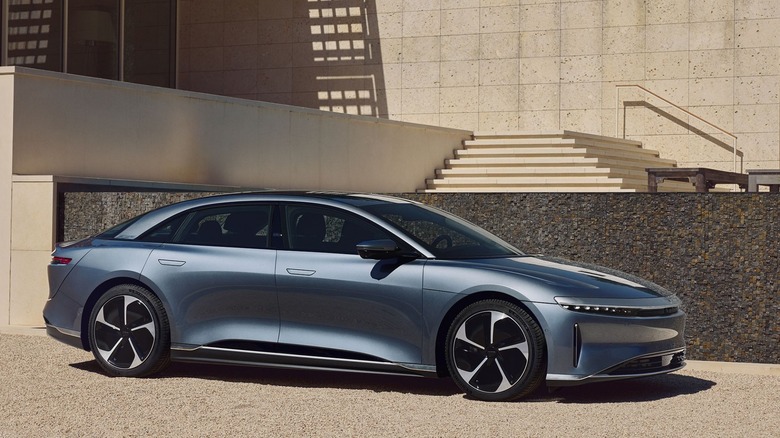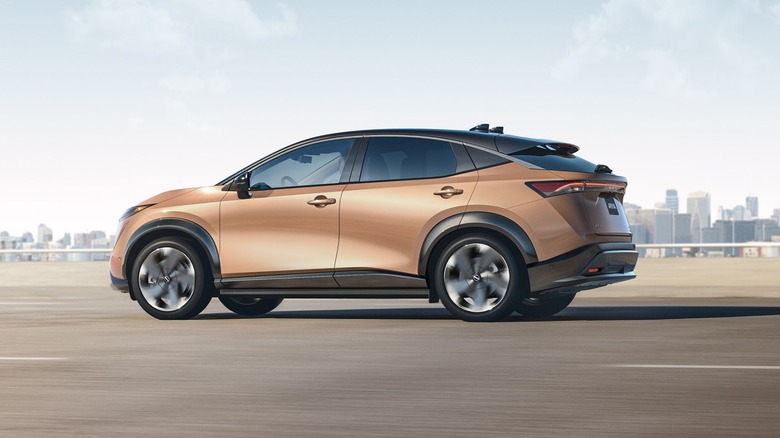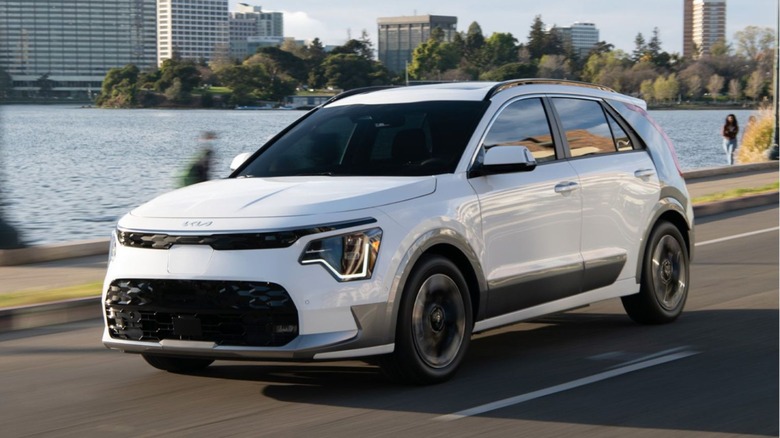Every Major Electric Vehicle Brand Ranked Worst To Best
Electric vehicles, once rare, are now nearly as affordable and available as many new gas-engine vehicles. There's never been a better time to go electric than right now. But with so many options from different companies, it can be difficult to figure out where to start your search. One of the most important features to look at in an electric vehicle is how much range you can get on a single battery charge. Take that EPA-estimated range, also displayed as MPGe, and compare it to the price of the vehicle you're buying. Some premium vehicles may come with a more luxurious interior or smarter features but have the same estimated range of a vehicle that's half the price. Consider
It's also important to look at a brand's EV recall history to learn what its most common issues are and how the company handled the situation for its customers. If a brand is consistently recalled, especially for major issues that cause a car to catch on fire or malfunction while in motion, that's not a great sign. That said, electric cars are more likely to be recalled than gas cars, though most recalls aren't drivetrain-related. Though these brands are ranked worst to best, all may be worth considering based on what's most important to you, and what you'd get for the price.
14. Brands with only one or two EVs
Whether a brand is just starting to get into the electric vehicle game or decided to perfect a single EV in its lineup, many brands currently only have one EV for sale. The 2023 Polestar 2 has three different powertrains to choose from, including a long-range single motor, a long-range dual motor, and a long-range dual motor with a Performance pack. The best value among these options is a Polestar 2 with the long-range single-motor powertrain, which starts at $49,500 and offers an EPA-estimated range of up to 320 miles. The brand has plans to release a Polestar 3 in the near future.
The Mini Electric is consistently a popular low-range option. The 2024 Mini starts at $30,900 and can drive up to 114 miles between charges. Honda's 2024 Prologue has a similar starting price as the Mini at $30,000 but will give users a longer estimated range of about 250 to 270 miles. Mazda's 2023 MX-30 EV starts at $34,110 and only offers an estimated 100-mile range, which is pretty low for the price. Finally, at $73,275, Jaguar's premium 2023 I-PACE is twice the price of Mazda's EV but offers more than twice the range at up to 246 estimated miles on a full charge.
13. Toyota
Toyota's EV lineup consists of the 2023 bZ4X SUV. With a 252-mile range and a starting price of $43,215, the bZ4X isn't a bad value, but it's not the best compared to other brands. There's also the 2023 Mirai, a fuel-cell electric sedan model that starts at $49,500, offers an EPA-estimated range of 71-76 miles, and requires regular fuelling (hydrogen) rather than electricity to run.
The Toyota EV platform is way behind the competition, with a limited EV lineup range, a pretty severe recall with its first all-electric vehicle (the bZ4X), and a major decision to go back to the drawing board with the company's EV strategy, putting 30 years of previous work on hold. Shortly after the 2023 bZ4X launched, Toyota had to recall 2,700 vehicles and stop production because of various issues including poor airbag installation and hub bolts potentially coming loose and causing a wheel to come off the vehicle while driving. After a lengthy three-month setback, Toyota resumed sales for the bZ4X.
Toyota stopped producing the electric RAV4 back in 2014, which was an entry-level option at around $13,055 with a 103-mile estimated range. The company has made it clear that it doesn't necessarily believe EVs are the only way to approach a carbon-neutral world. Right now, it seems like Toyota is putting more focus on developing its hybrid models than its electric models.
12. Audi
Overall, Audi has a good electric vehicle range with four SUV models and one sedan model. There are a few upcoming EVs from Audi, but the models currently available for sale as new include the 2023 Q4 e-tron, 2023 Q4 Sportback e-tron, Q8 e-tron, and Q8 Sportback e-tron. When it comes to the price of these EVs compared to the range you get for the price, that's where Audi falls short.
The best value EV, in terms of price and range, from Audi right now is the 2023 Q4 e-tron, which starts at $49,800 and has an EPA-estimated range of up to 265 miles. This price and estimated range are on par with a lot of other electric vehicles. Audi's worst-value EV is the e-tron GT, starting at $104,900 and offering an EPA-estimated range of up to 236 miles.
Of course, the interior of Audi EVs, as well as other smart features, add to the overall lineup's attractiveness. For some, paying more for these luxuries and getting less range than other EVs could be worth it. In Audi's favor, the brand also doesn't have many EV recalls to date and hopes to have a fully electric lineup by 2033. Furthermore, rather than trying to dispose of these large, powerful batteries, Audi partnered up with a startup called Nunam to recycle its e-tron batteries into electric-powered rickshaws.
11. Volvo
Volvo offers dependable electric vehicles, but when compared to other brands, there are better EVs with a longer range. The EV lineup from Volvo is currently limited to three SUV models including the C40 Recharge, EX30, and XC40 Recharge. In the near future, Volvo will offer the EX90 model, a 7-seater SUV. You can find the best range for the price in a Volvo EV with the 2023 EX30 SUV, which starts at $34,950 and offers an EPA-estimated range of up to 275 miles. The worst value is attached to the C40 Recharge, which starts at $55,300 but only offers up to 226 estimated miles.
The only notable recalls for Volvo's EVs recently have been with the 2021 and 2022 versions of the XC40 Recharge. There was an issue with water getting in around the accelerator pedal sensor that affected around 5,350 2021-2022 XC40 BEVs, an issue with the high-voltage battery system possibly disconnecting while driving that affected about 2,250 2021-2022 XC40 Recharge vehicles, and finally, a potential issue with the child restraint system for seat belts in 2021 XC40 Recharge vehicles, among other models, that affected over 19,000 vehicles.
Volvo's EVs may have a lower price to range value than other brands, but Volvo signed a deal with Tesla giving Volvo EV drivers access to Tesla's Supercharger network. All existing and upcoming Volvo EVs will have access to over 12,000 charging stations in the Supercharger network starting in mid-2024.
10. Volkswagen
In the electric vehicle lineup from Volkswagen, there's only one new model. The 2023 ID.4 has an SUV body, a 275-mile EPA-estimated range, and a starting price of $38,995. This is an excellent EV, but it's all Volkswagen has to offer, though Volkswagen plans to release a niche Microbus model called the ID. Buzz and a sedan model called the ID.7.
In 2019, Volkswagen ended production for its entry-level e-Golf vehicle, which offered a 125-mile estimated range and a $19,271 starting price. The company also made an excellent ID.3 vehicle priced around $33,650 for a battery capable of going an estimated 205 miles between charges, but it wasn't available in the U.S. There were two other ID.3 models with different battery sizes, one with a 261-mile range and the other with a 342-mile range.
There have been relatively few recalls for Volkswagen's EVs, with the most recent recall involving over 20,000 vehicles due to a software problem. This recall for certain 2021 ID.4 EVs addressed issues with the high-voltage battery control unit and the pulse inverter system. Because of these issues, it was possible for vehicles to temporarily lose power, though braking and steering would still be functional.
9. Rivian
Rivian is an expensive all-electric maker of trucks and SUVs but the estimated range for its two vehicles isn't bad for the price. The 2023 R1T offers up to 400 EPA-estimated miles of range and a starting price of $73,000 — and it's a rare pickup in the current market of EVs. Then, the 2023 R1S SUV starts at $78,000 and offers an estimated 390 miles of range.
You can definitely get a better deal in terms of what you pay compared to how far the vehicle goes between charges. However, Rivian is a relatively new, niche brand that's great for those who want a durable EV that can handle offroading. Rather than keeping the price low and offering a pickup or a large 7-seat SUV that skimps on range or functionality, Rivian offers its R1S and R1T vehicles only as premium-market options.
Last October, the company recalled nearly every electric vehicle it'd sold. About 13,000 vehicles (out of a total of about 15,000 vehicles produced in this run) were recalled because of an issue with a fastener-related suspension fault that could cause a driver to lose control of the steering wheel. No accidents or injuries were documented, but this is by far Rivian's biggest recall to date.
8. Tesla
Tesla is an all-electric brand with four distinct models, including two sedans and two SUVs, and 10 total unique versions of those four models to choose from. Each of Tesla's models offer high EPA-estimated mileage between charges, but the range compared to the price isn't always the best deal.
The worst range for the price is the Model X Plaid, which starts at $108,490 and offers an estimated range of 333 miles. For only $47,240, the Model 3 Long-Range Drive offers the same 333-mile range, making it currently the best-value EV from Tesla. Of course, it's worth mentioning that Tesla EVs, especially the more expensive options, come with a lot of neat features and more luxurious interiors. Plus, all Tesla EV owners can access over 12,000 charging stations in the Supercharger network.
Despite Tesla's wide array of prices and unique vehicle models, Tesla EVs get recalled more than any other car. This is largely due to the company's desire to add features that make the driving experience more fun and driving modes that tend to skirt the line of important safety regulations. Some of Tesla's biggest issues have been fixed remotely via software updates, but there have also been plenty of hardware recalls from the brand.
7. Chevrolet
Overall, Chevrolet is a highly affordable EV brand that's easy to jump into, especially in the used market. Right now, there are only two electric hatchbacks available in Chevy's current EV lineup: the Bolt EV and the Bolt EUV. Both of these 2023 vehicles offer a fantastic value, with the Bolt EV starting at $26,500 and offering a 259-mile EPA-estimated range, and the Bolt EUV starting at $27,800 and offering a 247-mile range.
Chevrolet will develop a next-generation Bolt following the discontinuation of the current era, keeping its budget EV going after outcry following a discontinuation announcement. The brand is also introducing three new EVs in late 2023. The new EV lineup will include the Equinox EV, Blazer EV, and Silverado EV—all-electric versions of popular internal combustion models from the company. The Equinox EV will be the closest to the Bolt EV's and EUV's value, with an estimated starting price of $30,000 and a 250-mile starting range.
Older Bolt EV models have had severe recalls for fire-related concerns, involving over 140,000 vehicles. In November 2020, over 50,000 units were recalled due to fire risk, and Chevy fixed the issue by capping the battery's charging capacity at 90%. Less than a year later, the recall was extended and the number of affected vehicles for this issue rose to over 142,000.
6. Ford
Ford's EV production is surprisingly innovative. The brand currently offers an SUV, a pickup, and a cargo van in its electric lineup, each of which is in high demand from consumers. 2023 Ford EV models include the Mustang Mach-E, the F-150 Lightning, and the E-Transit. From 2011 to 2018, Ford offered an entry-level hatchback, the Focus EV, priced at $14,673 with a 115-mile range.
Though the new models are far pricier than Ford's old Focus EVs, the range has more than doubled for the Mustang Mach-E and the F-150 Lightning. The 2023 Mach-E is Ford's best-value EV right now, with a starting price of $44,795 and an EPA-estimated range of 312 miles. With its pickup body, the F-150 Lightning is pricier, starting at $61,869, and it has an estimated range of 300 miles. The E-Transit cargo van has a starting price of $51,390 and a 126-mile range. Ford's electric cargo van is the worst value by range, but it can hold a lot of stuff, making it fantastic for any profession that requires moving a lot of stuff from one place to another across a short distance.
In late 2022, Ford issued a recall for over 500,000 vehicles for a software glitch and fire risk, but this recall only applied to 2020-2023 Ford Escape and Bronco Sport vehicles. The Mustang Mach-E faced a small recall in 2021 regarding subframe bolts not being tightened properly, as well as a larger recall affecting over 49,000 vehicles regarding propulsion power risks.
5. Hyundai
Hyundai's electric vehicle lineup includes three unique vehicles — two SUVs, the 2023 Kona Electric and 2023 Ioniq 5, and the 2023 Ioniq 6 sedan. All three Hyundai EVs offer fantastic value for range vs. price. The 2023 Ioniq 6 is currently Hyundai's best-value EV with a starting price of $41,600 and a 361-mile range. This electric sedan is more expensive than Hyundai's two SUVs but it's one of the most affordable electric sedans you can buy new on the market right now.
Hyundai's 2023 Ioniq 5 is the worst value out of the company's EV range specifically, but still an amazing value compared to other car brands. For a $41,450 starting price, the Ioniq 5 has an estimated range of 303 miles. Following fairly closely behind in terms of value is the 2023 Kona Electric, which starts at $33,350 and has a 258-mile range. Hyundai also has a more premium line of EVs under the Genesis brand name, including two SUVs and one sedan. The best value option with this high-end brand is the 2023 Genesis GV60 SUV, which starts at $59,290 and offers a 248-mile range.
In recent history, the only significant recall involved 2019-2020 Kona EVs and 2020 Ioniq EVs, affecting around 82,000 vehicles. This massive Hyundai EV recall was due to fire risk when charging the battery system; instead of decreasing max charging capacity to 90% like other brands have done, Hyundai took on an estimated $900 million to replace the battery in affected vehicles.
4. BMW
BMW has a four-vehicle electric lineup with a mix of SUV, coupe, and sedan styles. When compared to Tesla, BMW may have a slightly smaller range for the price with some models, but the company offers more style variety and certainly fewer overall recalls.
The best value EV you can buy new from BMW is the coupe-style 2023 i4 model. With a starting price of $52,200, the i4 can drive 295 miles (EPA-estimated) on a single charge. The next best value is the 2023 i5 sedan at $66,800 with a 295-mile range, followed by the iX SUV at $87,100 with a 307-mile range. The worst value from BMW, strictly in terms of price versus estimated range, is a huge jump from even the iX SUV. BMW's 2023 i7 sedan starts at $124,200 and has the smallest range of the previously mentioned EVs at only 218 miles. However, there are luxuries that come with a price tag that high, including the speaker system, extra smart features, a gorgeous interior, more cargo space, and hefty tires. There haven't been many recalls for BMW EVs over the years, but there was a significant recall in 2022 that involved over 14,000 total vehicles. No accidents were reported, but the recall was to address an issue with the high-voltage battery electronic control unit that could result in a loss of power.
3. Lucid Motors
Lucid Motors is a fully electric automaker that currently offers a sedan, the Lucid Air, with three unique trims and a fourth trim on the way. The brand has an SUV, the Lucid Gravity, coming in 2024. The models that Lucid Motors offers are top-tier, albeit pricey, EVs on par with the most expensive Tesla models. However, they offer a much better value than Tesla's current lineup. The best value from Lucid Motors is the Lucid Air Pure, which starts at $87,400 and has an EPA-estimated range of 410 miles.
Even the worst value from Lucid Motors, the Air Grand Touring, is by performance a better value than many other brands, despite its high sticker price of $138,000. Lucid Motors' Air Grand Touring has an estimated range of 516 miles, the highest of any current EV. To top it off, Lucid Motors doesn't have many recalls to date. There was a small 203-vehicle recall for 2022 Air models to address possible failure with a snap ring that could damage the front brake line, and a recall affecting a possible 1,117 2022 Air vehicles for a display screen issue. The "biggest" recall involved 637 Air models from 2022-2023 and addressed the possible issue of the electric motor shutting down unexpectedly.
2. Nissan
Nissan currently offers two EVs, the 2023 Leaf hatchback and the 2023 Ariya SUV. The Leaf model will likely be discontinued over the next few years, and hopefully replaced with a more attractive (and similarly priced) model, as the Leaf's awkward design was often the biggest complaint from consumers. The 2023 Leaf starts at $36,040 with a 60kWh battery and at $28,040 with a 40 kWh battery, and its highest possible EPA-estimated range is 212 miles. While the Leaf offers a decent range for the price, the 2023 Nissan Ariya is a better-looking, better-value vehicle. The 2023 Nissan Ariya starts at $47,190 with an 87kWh battery and at $43,190 with a 63kWh battery and offers a max range of 304 miles. The 2023 Nissan Ariya E-4ORCE is noted for its solid range and quiet cabin.
There aren't many recalls for Nissan's two EVs. The 2023 Ariya had a steering wheel recall that affected about 1,000 vehicles, and the Leaf was involved in a larger 1.4 million-car recall in 2023 that included several Nissan models.
1. Kia
Kia's EV lineup currently offers two SUV models, both of which are fantastic overall electric vehicles. There's the 2023 Niro EV, which starts at $40,875 and offers a 253-mile EPA-estimated range. Then, there's the 2023 EV6, which is a bit pricier with its $50,025 starting price but offers a longer max range of 310 miles. The Niro EV and EV6 are pretty similar in terms of value. There's also a premium SUV option upcoming from Kia called the EV9.
Kia also used to produce the Soul EV wagon, but unfortunately, like many other EV brands, Kia opted to remove the entry-level Soul EV in favor of longer-range, more expensive EVs. The last Soul EV was sold in 2019, with a starting price of $21,082 and estimated range of 111 miles. There was a new version of the Soul EV, but it wasn't released in the US.
There aren't many recalls for Kia's EV model. For 2015-2019 Soul EVs, Kia issued a fire-risk recall that affected about 2,700 vehicles, regarding the high-voltage battery pack potentially short-circuiting while driving. Then, there was a joint recall from Hyundai and Kia involving parking brake issues that were fixed via a software update; this affected about 9,000 Kia EV6 vehicles.
